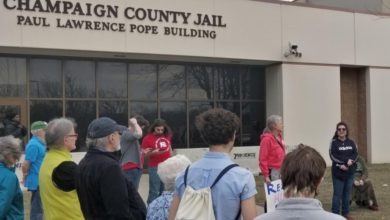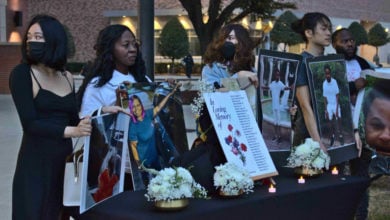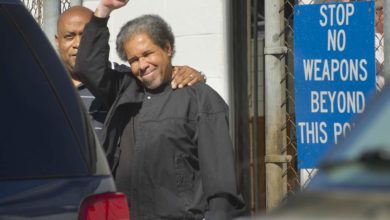On Dec. 9, prisoners in Baldwin, Hancock, Hays, Macon, Smith and Telfair state prisons in Georgia went on strike. Prisoners are demanding to be paid for the work they do, to receive adequate healthcare and nutritious food and to have access to educational opportunities. They are calling for and end to “cruel and unusual” punishment.
 |
In a move almost unprecedented inside prisons, convicts have reached across the often violent divide between nationalities. Based on contact with the striking prisoners a supporter and press spokesperson told Liberation: “Blacks, whites, Mexicans, Rastafarians, Muslims, Christians, you name it, they are united.”
Additionally, the prisoners have overcome oppressive communication restrictions, using various means including texting via contraband cell phones in order to continue to keep facilities connected.
According to a press release issued by strike supporters, prisoners refused to work, stopped all other activities and remained in their cells. What originally began as a one day protest has continued. As of Dec. 14 prisoners continue to fight for their rights, and have turned their strike into an open ended action. The spokesperson related a message from one prisoner: “We’re not going to break.”
Despite attempts by the Georgia Department of Corrections to create a media blockade, reports have leaked out describing retaliatory treatment in some of the prisons. In Telfair state prison it was reported that guards and prison officials beat inmates, destroyed their personal effects and turned off the heat in 30-degree weather.
In Macon State Prison, authorities are said to have cut off hot water for inmates. Inmates have told their contacts on the outside of threats to use dogs as well.
Despite the violence and repression at other prisons, inmates at Rogers State Prison have now also joined the strike.
Georgia state inmates are subject to inhumane treatment, with cruel punishments and sub-standard medical care. They are not able to pursue any meaningful educational opportunities, and if released are equipped only to become part of the low wage work force if they can get any job at all. Prison families also face additional hardship when they try to support their loved ones which charge exorbitant rates for their “services.” Prisoners in the Georgia prison system do not receive any pay for the work they do.
High rates of incarceration are a fact of life in Black communities around the country. De-industrialization and skyrocketing unemployment hit the Black working class harder than any other sector. Combined with the over 30-year assault on working-class living standards in general, poverty and destitution also skyrocketed.
As a result, millions of members of the “reserve army of the unemployed” have been thrown in prison on non-violent drug charges, and those incarcerated are treated like unredeemable monsters, forced to work for free or for a pittance, and denied educational opportunities almost universally.
Dealing with the root cause of this “prison population explosion,” would reveal that it is of the capitalists’ own making. Their anti-working class policies created the social context for crime, and their racist drug laws have created a demonized “criminal” population of millions of working class, Black and Latino youth to whom they have already denied any option for a decent standard of living.
The Georgia prisoners have issued a set of demands to improve the onerous and oppressive living conditions in which they are forced to exist, demands that speak to all thoses trapped in the so-called criminal justice system. According to the press release issued by supporters, Georgia prisoners are demanding:
“A LIVING WAGE FOR WORK: In violation of the 13th Amendment to the Constitution prohibiting slavery and involuntary servitude, the DOC demands prisoners work for free.
“EDUCATIONAL OPPORTUNITIES: For the great majority of prisoners, the DOC denies all opportunities for education beyond the GED, despite the benefit to both prisoners and society.
“DECENT HEALTH CARE: In violation of the 8th Amendment prohibition against cruel and unusual punishments, the DOC denies adequate medical care to prisoners, charges excessive fees for the most minimal care and is responsible for extraordinary pain and suffering.
“AN END TO CRUEL AND UNUSUAL PUNISHMENTS: In further violation of the 8th Amendment, the DOC is responsible for cruel prisoner punishments for minor infractions of rules.
“DECENT LIVING CONDITIONS: Georgia prisoners are confined in over-crowded, substandard conditions, with little heat in winter and oppressive heat in summer.
“NUTRITIONAL MEALS: Vegetables and fruit are in short supply in DOC facilities while starches and fatty foods are plentiful.
“VOCATIONAL AND SELF-IMPROVEMENT OPPORTUNITIES: The DOC has stripped its facilities of all opportunities for skills training, self-improvement and proper exercise.
“ACCESS TO FAMILIES: The DOC has disconnected thousands of prisoners from their families by imposing excessive telephone charges and innumerable barriers to visitation.
“JUST PAROLE DECISIONS: The Parole Board capriciously and regularly denies parole to the majority of prisoners despite evidence of eligibility. Prisoner leaders issued the following call: ‘No more slavery. Injustice in one place is injustice to all. Inform your family to support our cause. Lock down for liberty!’”
All revolutionary and progressive people should support the Georgia prisoners’ demands for just treatment.
Victory to the Georgia prisoners’ strike!
Down with the racist, anti-worker prison system!
Please call the prison authorities and demand no reprisals or punishments for striking prisoners!
Macon State Prison is 978-472-3900.
Telfair State Prison is 229-868-7721
Valdosta State Prison is 229-333-7900
Hays State Prison is at (706) 857-0400
Baldwin State Prison is at (478) 445- 5218
Smith State Prison is at (912) 654-5000





